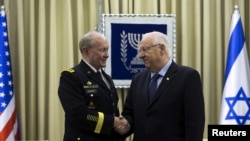The outgoing chairman of the U.S. Joint Chiefs of Staff, General Martin Dempsey, sought to reassure Israel of continued U.S. military assistance in the face of the growing security threat posed by Iran.
In Jerusalem, Dempsey said the U.S. will help Israel improve its air and missile defenses, as well as cyber and maritime security.
The New York Times says Israeli officials pressed him to expand long-term maintenance of Israel's qualitative military edge over regional adversaries. The report says it reflects not just increased anxiety over an international nuclear pact with Iran, but increased U.S. supplies to Arab countries also fearful of Tehran.
Dempsey said the long-term prospects are better under a comprehensive nuclear agreement to keep Tehran from becoming a nuclear weapons power. He is on his fifth and final trip to Israel before retiring in October and said Washington was "clear-eyed about the risks that Iran poses to the region" and will work with U.S. allies to address those risks.
Regional analyst Ian Lustick of the University of Pennsylvania told VOA the Dempsey visit is part of a broader U.S. effort to rearrange the relationship with Israel.
Luctick says General Dempsey is right when he acknowledged that sanctions relief could give Iran the ability to better support its Shi'ite surrogates like Hezbollah and further build up its military capacity. He says there is no question Tehran wants to be a regional superpower. He says, while Israel wishes to retain sole possession of that title, that is no longer realistic in a new Middle East Lustick says he expects will be dominated by Israel, Iran, Turkey and to a lesser extent Egypt and Saudi Arabia.






